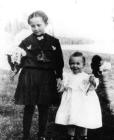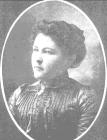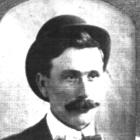1
It was a very good yearIt is the year 1915. Al Huble and his partner Ed Seebach have been traders working from the head of the Giscome Portage for 11 years. Three years ago Al married and brought his new wife and her two children to the portage. He built a new solid squared log house and continued to run a thriving business trading, freighting goods and farming. This exhibit will bring you to the Giscome Portage to experience what our early settlers and entrepreneurs experienced by telling the whole story of a single year at the portage, a place which is today know as "Huble Homestead". The story is told using documents, interviews, and photographs which include both historic photos and special photos taken at the portage that were "set up" just for this project. So get ready, relax, and enjoy A year in the life of Huble Homestead: 1915
Every season was chock full of things to do. Freight was hauled all year round. Spring time saw new visitors, riverboat freight to haul and repairs to the portage. Summer was spent tending the garden, as well as the store and trade from stations at Giscome Portage, Summit Lake and Fort McLeod. Fall was harvest time, pulling the last wagon loads of freight, setting up the animals for the winter and hiring the people of the First Nations to help with all of this as well as helping to build new buildings. In the winter the homestead/trading post received many visitors. Transportation was by dog team, Seebach and Huble also ran a trap line and actively traded furs.
2
Al Huble's Diary: Summer June 21 to September 20Monday 21st June, 1915 Put shoes on horse. Went to Ed ranch. Fine day.
Tuesday 22nd Stayed at Ed [sic] ranch. Rolled meadow. Fine hot day.
Wednesday 23rd Hoed potatoes on Ed's ranch in morning. Came home. Fine warm day.
Thursday 24th Cut wood and cultivated potatoes. Fine day.
Friday 25th Cultivated potatoes. Ed and Bert went to Ft. George. Fine day.
Saturday 26th Built fence and hoed potatoes. Cool day.
Sunday 27th Stayed at home. Menzegore came today. Anna went home. Fine day.
Monday 28th Hoed potatoes. Came to terms with Hanes [sic] today. Circle W came up. Fine day.
Tuesday 29th Hoed potatoes. Haynes went out to hunt deer. Fine day. Iver [sic] came.
Wednesday 30th Hoed potatoes. I went to the lake. Fine day.
Thursday July 1st Hoed carrots and fixed motor boat. Fine day.
Friday 2nd Worked in the garden. Went to Summit Lake.
Saturday 3rd Iver [sic], Bert and myself went down to Cariboo Park Ranch. Fine day.
Sunday 4th Came home from Cottonwood camp. Very warm day.
Monday 5th Cut stove wood. Very warm day.
Tuesday 6th Cultivated potatoes and cut stove wood. Very warm day.
Wednesday 7th Cultivated potatoes. Ed took Brown and Maxine to Prince George. Mr. and Mrs. A. stayed tonight.
Thursday 8th Worked in store and worked at new barn. Heavy rain.
Friday 9th Worked at the new barn. Very wet day.
Saturday 10th Worked at barn. Very wet day.
Sunday 11th Stayed at home. Very wet day.
Monday 12th Worked at barn. Bob MacWilliams arrived with mail. Wet day.
Tuesday 13th Worked at barn. Fine bright day.
Wednesday 14th Fixed up mower and started to cut Hayne's hay.
Thursday 15th Worked at barn. Fine day.
Friday 16th Worked at barn. Fine day.
Saturday 17th Took load to Summit Lake for 2 prospectors. Very warm day.
Sunday 18th Went out to Sannas' ranch. Fine bright day.
Monday 19th Took Jack Eavens and Bugman [probably Bergman - Chamberland] across. Fine day.
Tuesday 20th Took big boat across for Groel. Fine day.
Wednesday 21st Took load across for Grole [Greel ?- Chamberland]. Fine day.
Thursday 22nd Took load across for Grole [?] and Scott. Very wet day.
Friday 23rd Came home in afternoon and shod horses. Bright day.
Saturday 24th Hilled potatoes and raked hay. Fine bright day.
Sunday 25th Hauled in hay. Very warm day. Annie and Mrs. Sannas went up to pick berries.
Monday 26th Took load across portage for H. B. C. Catispell came home with wan [?]. Very warm day.
Tuesday 27th Cultivated potatoes. Woman folks went picking berries. Warm day.
Wednesday 28th Hauled load to Summit Lake for Bradis. Very warm day.
Thursday 29th Cultivated potatoes. Very warm day.
Friday 30th Worked at the potatoes. Iver [sic] came today. Very warm day.
Saturday 31st Hauled canoe and outfit from Summit Lake for Forestry Department.
Sunday August 1st Stayed at home. Bert, Annie, and the Sannes [sic] went to the lake. Fine day.
Monday 2nd Brought boat and outfit across the portage for miners. Fine day.
Tuesday 3rd Hoed in the garden. Ed went to Ft. George. Some rain.
Wednesday 4th Worked in the garden. Bert Seebach started for Ft. George. Fine day.
Thursday 5th Built approaches to driveway in barn. Ed came home. S. S. Circle W arrived. Fine day.
Friday 6th Finished hoeing. Cut some hay. Fine day.
Saturday 7th Cut and hauled poles for new barn. Got lumber from raft. Fine day.
Sunday 8th Stayed at home in morning. Went out to John Sannas in evening. Fine day.
Monday 9th Baker and I cut barley. Fine warm day.
Tuesday 10th Went out to look at Hickey's pre-emption and raked barley. Fine day.
Wednesday 11th Worked at barn and hauled in barley. Starting to Prince George tomorrow.
Thursday 12th Rode [sic] old Dennis [a horse] to Prince George. Hot day.
Friday 13th Stayed at Prince George. Hot day. Took Hickey's pre-emption.
Saturday 14th Came home with buggy. Warm day.
Sunday 15th Done some odd jobs for Drive. Fine day. Ed went across portage.
Monday 16th Cradled the wheat. Foster's joy party went down river. Fine day.
Tuesday 17th Went out and looked at new pre-emption. Fine day.
Wednesday 18th Worked at boat. Ed went to Willow River. Fine day.
Thursday 19th Worked at boat. E. returned from Willow River. Fine day.
Friday 20th Went across the portage. Started down Willow [sic Crooked] River. Camped at foot of lake.
Saturday 21st to Thursday 26th
Camped on Crooked River. Fine warm weather.
Friday 27th Arrived at Summit Lake in evening and walked across the portage. Fine day.
Saturday 28th Moved family from Summit Lake. Aylmer and party went down river.
Sunday 29th Went out to the Hickey place. Fine day.
Monday 30th Hauled in oats and peas. Rained heavy in evening.
Tuesday 31st Hauled stove wood and raked [wheat] stubble. Fine cool day.
Wednesday September 1st Hauled Jack McGiniss [sic] and Cowart across the portage. Arnold party back.
Thursday 2nd Built fence. Ed, Annie, and Bertha went up river with motor boat. Fine day.
Friday 3rd Mowed oats. Some showers of rain. Folks did not get home from up river.
Saturday 4th Went over to Ed's place and took Ingins [sic] freight across portage. Fine day.
Sunday 5th Went over to the new meadow to cut oats. Fine day.
Monday 6th Finished the oats and brought the mower home. Sprained my ankle. Some rain.
Tuesday 7th Stayed at home. Had sprained ankle. Old A. G. crossed portage in the night.
Wednesday 8th Mowed clover and done some plowing. Baker came to the store.
Thursday 9th Cot [sic cut] some clover and plowed with 4 horses. Fine cool day.
Friday 10th Raked and hauled in oats. Furgisan [sic Ferguson ?] and Grose went to Ft. George. Fine cool day.
Saturday 11th Hauled in oats. Loaded rake and got ready to go to Ed's ranch. Fine day.
Sunday 12th Went over and raked up the oats on Ed's ranch. Fine cool day.
Monday 13th Baker, Annie, Bertha and myself drove to Prince George. Fine day.
Tuesday 14th Took the exhibits to fair grounds. Got first prize on collection of grain.
Wednesday 15th Stayed at Prince George. Some rain.
Thursday 16th Went out to L. C. Gunn's ranch and bought cattle. Wet day.
Friday 17th Arrived at Giscome [sic Portage] at 3 o'clock. Ed went to Ft. George. Cool day.
Saturday 18th Went over to Ed's place to coil the oat hay. Fine cool day.
Sunday 19th Stayed at home. Fine bright day. Haines [sic] came for big team.
Monday 20th Worked at hay on Ed's pre-emption. Fine bright day.
3
A reconstruction photo, taken in 2003, of harvesting the summer garden.August, 2003
Huble Homestead/Giscome Portage on the Fraser River, North of Prince George, British Columbia, Canada
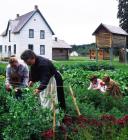
4
Summer at Huble Homestead/Giscome Portage 1915It's the summer of 1915, forty-one miles north of Fort George at the Giscome Portage. Annie Huble is in her garden with three of her children, Ada, Bertha and Martha, as well as the family midwife, Clara Radke. Clara has Bertha between her arms as she tells her which raspberries to pick. It's July and the raspberries are ready for harvesting. Annie, Clara and Bertha are picking raspberries while Ada and Martha are picking flowers. The Huble homestead at the Giscome Portage is a busy place all year round, but the summer is particularly hectic. For Annie, there are the young children to look after, the boarders to feed, house cleaning, mending, knitting, quilt making, sewing the families clothes, ironing, preserving and canning the fruits, vegetables and meat and finding some time later in the evenings to spend with her husband Albert James Huble.
While Annie is in the garden with two of the children, Al Huble is down at the dock and warehouse off loading another sternwheeler that is carrying travelers and Hudson Bay Freight to be hauled over the portage. Al and Ed Seebach (Al's partner) take the freight off the boat on the Fraser River and store it in the warehouse until it is to be freighted in the Peace River area.
The year 1915 meant the country was at war; however, the portage was still a relatively busy place with the development and settlement of the Peace River area still in progress. The Dominion Government opened the Peace River area for agricultural settlement in the year 1909. That promotional opening meant a great deal of activity for the entrepreneurial pair of Ed Seebach and Albert Huble at the portage. The Giscome Portage was the transportation link between southern and British Columbia and the Peace River region before 1919, when a wagon road was built from Fort George to Summit Lake. The Giscome Portage was the only link before that time which brought travelers over the continental divide from the upper Fraser River to the watercourses flowing northward into the Peace. In the summer of 1915, Al and Ed were still very busy freighting goods and guiding people over the continental divide on the portage to Summit Lake where they would proceed downstream over many watercourses and into the Peace River area.
Many travelers on their way to and from the Peace River region spent nights and had many meals with the Huble family. The Huble family home was much like a Cariboo roadhouse in a way. The difference was that these travelers were traveling by water rather than by the wagon road. The Huble children have recalled that at times there were up to 40 people around that place and at the dining room table. Annie must have been an exceptionally busy lady, to have managed that kind of activity in her household, especially considering the very simple amenities that her home had and the amount of food she grew and processed. In 1915 Annie did not have a dishwasher, a clothes washer and dryer, electric power, refrigeration or even a cooking range. Annie cooked on a wood cook stove and canned, smoked or salted all the family food to keep it safe for consumption. A log structure, propped on stilts and called a food cache, can be seen in this picture. The family stored all kinds of food in this cache, up off the ground and away from the bears and other animals wanting to get at the food. Annie's day did not end with the garden work; she also made most of the family's clothing and blankets by hand, and by candle or kerosene lantern lighting. These were tough times. The Huble family was far from any town or village. They were many miles from Fort George, which was the closest town, by river or through dense forest on horse or foot. Every day was filled with endless chores; however, it was a good wholesome life.
So, here Annie is in the garden, picking raspberries, one of the many chores of the day, her heart light and her hand steady!
5
Reconstructed letters about Annie Huble's life and character by museum researcher, Darla Dickinson.2003

6
Reconstructed letters about Annie Huble's life and character by museum researcher, Darla Dickinson.2003
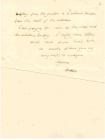
7
These letters written by museum researcher, Darla Dickinson. They are based on research into Annie Huble's life and character. There are no known letters written by Annie that exist today. The letters show the work required in each season and cover the years from 1912 to 1915.Each of the seasons begins with one of these imaginary letters.
July 1, 1914
Giscome Portage
Dear Friend,
Ada is coming home today! I fed and watered the stock this morning, the heat was already intense from the sun. It was quite enjoyable. Today is devoted to canning, it is that time again! Ah Yee (the cook Al obtained), and I will be working within the kitchen, the stove is already stoked. I fear this lovely day will make the kitchen stifling. Perhaps I may find a chance though to escape to Berry Hill and get some picking done.
Well canning is nearly completed, and last night we had two overnight guests. I just finished clearing the old linens off the bed and replacing them with new. Hanging laundry with the damp sheets whipping from the beeeze and the scent of flowers wafting from the gardens is a welcome respite from the heat of the kitchen!
I am praying for rain as the crops need the moisture terribly. I enjoy your letters and news from home ever so much, please give my best to everyone.
Yours,
Annie
8
Huble family outing with Al Huble holding Sam, and Annie Huble behind him.1923
Summit Lake, British Columbia, Canada
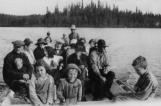
9
The Huble FamilyWe would like to introduce you to the Huble Family. Annie and Al Huble were married in 1911. Annie brought with her to Huble Homestead Ada, a child from a previous marriage. By 1915 three more kids were born. Bertha(1911), Martha(1913), and Pat(1914). Later there was May (1916), Al Jr. (1918), Sam (1921) and Dean (1930?).
The photo shows a special outing with many friends and family. It was taken about 1923 but many similar boat trips must have occured in 1915.
At left Al Huble is holding Sam, Annie Huble behind him, Pat in front, Bertha in sailor blouse behind Pat. Young Al Huble Jr. sitting to the right on edge of boat.
11
Annie HubleAnne May Hart was born in 1882 and lived in Havelock, Ontario when Albert Huble courted her in the winter of 1910/1911. Anne (Annie), was previously married, with three children, Adelaide Marion (Ada), Lillian and Harry, before her marriage to Albert James Huble (Al). When Al went back to Ontario in 1910 for Christmas, he stayed for a number of months. In March he purchased an extra ticket on the train to Ashcroft, B.C. for his new wife. Al and Annie arrived in Ashcroft B.C. on the train on March 15th 1911. Al and Annie had their first common child, Bertha Bernice, on October 17, 1911.
Over the next 20 years, Annie had six more children with Al, three more girls and following, three boys. A typical day for Annie, according to Al Huble Jr., was to rise at 6:00 a.m. and prepare and serve breakfast for the family and any traveling house guests. Following that, Annie cleaned-up the dishes, washed the laundry, prepared lunch, cleaned-up and washed lunch dishes, took in the previous day's laundry from the clothesline and hung out the new clean laundry. After this Annie ironed, with an iron heated on the wood cook stove. While doing all of these chores, she took care of all the children, including babies. In the late afternoon, Annie also gardened or cleaned the family home. In the evening, she prepared dinner for the family and, often, large groups of travelers, or visitors, following which she again cleaned up and washed dishes.
The Huble Homestead was a much like a Cariboo roadhouse; however, rather than being literally on the Cariboo Road, it was a stop along a lengthy series of watercourses. This watercourse route connected the Omineca gold fields and Peace River Valley with the rest of B.C. Therefore, the Huble home was more than just a busy family home, which Annie had to look after; it was also a busy roadhouse.
Annie raised her large family, grew and preserved most of the family food and made most of the family's clothing on top of being an innkeeper. After the children were in bed, Annie would knit or sew the children's clothing, or do quilting.
The Prince George Citizen marked the passing of Annie Huble in their December 8th, 1949 edition as follows.
"Mrs. Annie May Huble, who not only had the reputation of being able to shoot as well as any man, but also managed a trap line and several trading posts at different times passed away in Prince George on December 1.
An old timer of the true pioneer stock, Mrs. Huble came here in 1910 and raised nine children. She died at the age of 65 after being an invalid for some time…..
Predeceased by her husband, who was a fur trader, Mrs. Huble has lived at the Summit Lake trading post of Seabeck [sic] and Huble and also at the Giscome Portage trading post where some of her children were born.
The funeral was held from the funeral chapel on Monday with Rev. Dermott McInnes officiating. Pall-bearers were E.H. Burden, R. Corless, Ed Volsen, A.B. Moffat, H. Geise and Chas Van Somers ."
13
Albert James Huble:Audio Quote:
Al Huble jr. Taped Interview
"They bought a schooner, a fishing schooner, they were gonna go and fish and they had about the first trip out, they were all green horns and got in the middle of a storm. When they got ashore he was trying to --------------- They'd heard all the stories about what was going on out West. Young guys ---------- he was up logging in the Columbia River country. Those, there was quite a bit of logging and I met some, the Otto(?) brothers, they're settled in Jasper. They were young guys logging up there on the Columbia ------- and Joe came on the Fraser, up the canoe river and down the Fraser at Tete Jeune ------- a short portage around Valemont. Quite a few people come into this country that way, by canoe off the Columbia River and then down the Fraser. Joe -------- I guess dad was in there ---- fishing in ------ then went to the gold rush but he hikes out and ------- crossed the head waters and ------ around the Liard and came out, let's see, the Stikine. Stayed around there "
Albert James Huble
Albert James Huble was born at Oak Lake, Ontario on September 4, 1872. He was the fourth child in a family of seven daughters and four sons. At age thirteen, he left home and moved to Chicago, where he spent the next five years. It is not known what Al did for the next while; however, around 1891 he went west to work on the construction of the Canadian Pacific Railway in British Columbia in the Kootenay area. Following this, he headed off to the Yukon Gold Rush. On route, he stopped by Hazelton, at the confluence of the Skeena and Bulkley Rivers. There he met a man named George Burns. He and George became partners and they headed over the Telegraph Trail towards Atlin in northwestern B.C. to find their fortune in gold. While in the Atlin area they tried trapping. The two found trapping paid very well, so they gave up the notion of finding gold. However, three years later, they found they wanted to try something different so they bought a ship for fishing over near Wrangell, Alaska. The two had no experience in fishing in ocean waters so they almost drowned. Following that, Al tried his hand working at a barber-shop back in the Hazelton area, where he worked for a few years. In 1904, he began a partnership with Ed Seebach in the Fort George area. During the winter of 1903/04, they ran trap lines, just north of the big bend on the Fraser River. In 1904, the two established a fur trading post on the Fraser River at the south end of Giscome Portage. Al Huble settled in and pre-empted land there in November of 1905. Al Huble Jr. felt that his father, Albert, was "an adventurous soul".
Albert Huble was an entrepreneur. He and his partner Edward Seebach, created a chain of three warehouses and stores from the homestead at the south end of Giscome Portage, all the way to McLeod Lake (including the one at Summit Lake). Additionally, he trapped, bought, sold and traded furs, hauled freight and transported people over the portage. He surveyed land and guided river travelers through the Giscome Rapids and ran a roadhouse (of sorts) at the Huble family home. Al wrote a speech in his diary of 1915. It went like this;
"No one will deny the demoralization of any useful industry is in economic waste. A bad thing for the public at large and that its stayability [sic] based on a sure but moderate profit is the ideal condition for the consumer as well as for those directly or indirectly connected with its activities.
Wreckage always means waste and financial wreckage is no exception to the rule. A few individuals may secure a momentary benefit from an industrial failure but to society at large it invariably involves a final net loss. Labor suffers, investment suffers, and the body of business in general is disordered.
The modern association spirit is a good one. You can't beat it. Sneaking trade secrets and trying to throttle the man who happens to be your competitor belong to the dark ages of industrial competition. To the period of federalism the associations are now driven out of business. I would hate to think of any line being without an association. Instead of continually reacting for one another's throat we are doing something for the good of the line and everybody in it."
Whether Al Huble wrote this speech or not, and it is believed that he did, the speech undoubtedly speaks of his business ideals.
Al Jr. said that his father "was a one drink guy and two would be a great occasion". He also said that his dad smoked a pipe, "but not those cigarettes." He said, his dad would describe a guy with a cigarette in his mouth as "a cigarette hanging down his lip like a porcupine quill in a dog's mouth."
According to Al Jr., Christmas time was special too. He told this story;
"He came down to the portage from the McGregor one year. He got there December 22nd and the next morning he took off breaking trail to Fort George, down there 45 miles with a toboggan. Christmas Eve, he was back home with the toboggan and all the goodies for Christmas. He must have been tough, I don't know. He'd buy things, he loved oysters, he'd get them little wooden kegs of oysters and a half a beef; whatever was available."
14
Ada Huble on the left and Bertha Huble on the right ca. 1913.1913
Huble Homestead/Giscome Portage on the Fraser River, North of Prince George, British Columbia, Canada
